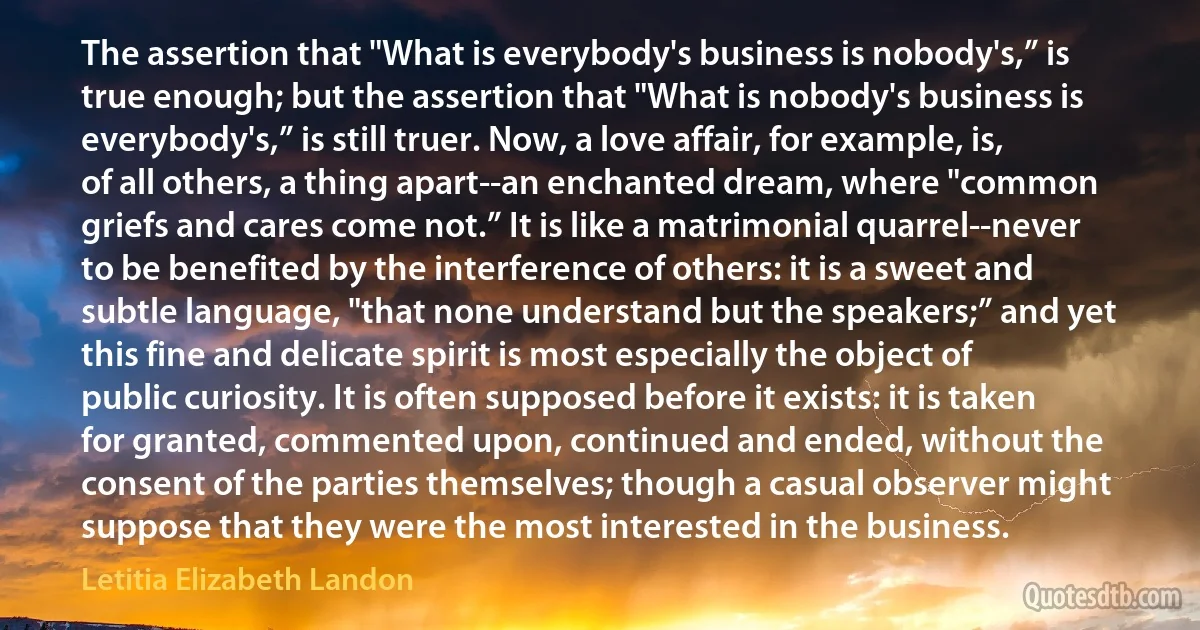
The assertion that "What is everybody's business is nobody's,” is true enough; but the assertion that "What is nobody's business is everybody's,” is still truer. Now, a love affair, for example, is, of all others, a thing apart--an enchanted dream, where "common griefs and cares come not.” It is like a matrimonial quarrel--never to be benefited by the interference of others: it is a sweet and subtle language, "that none understand but the speakers;” and yet this fine and delicate spirit is most especially the object of public curiosity. It is often supposed before it exists: it is taken for granted, commented upon, continued and ended, without the consent of the parties themselves; though a casual observer might suppose that they were the most interested in the business.
Letitia Elizabeth LandonRelated topics
business casual common consent dream enough example fine interference language love matrimonial might none now observer public spirit suppose sweet take thing yet othersRelated quotes
When rent in twain, British Abolition, which in fanaticism and sacrificial spirit, far exceeds that of the North (for it has been willing to pay for its fanaticism, a thing the North never will do), will have none of the impediments in its path, now to be found. England will no longer fear the power of the mighty nation which twice has humbled her, and whose giant arm would, so long as we are united, be stretched forth to protect the weakest State, or the most obscure citizen. The State that secedes, when pressed by insidious arts of abolition emissaries, supported by foreign powers, when cursed by internal disorders and insurrections, can lay no claim to that national flag, which when now unfurled, ensures the respect of all nations and strikes terror to the hearts of those who would invade our rights.

Sam Houston
He went on to speak of the manner in which slavery was treated by the Constitution. The word 'slave' is no where used; the supply of slaves was to be prohibited after 1808; they stopped the spread of it in the territories; seven of the states abolished it. He argued very conclusively that it was then regarded as an evil which would eventually be got rid of, and that they desired, once rid of it, to have nothing in the constitution to remind them of it. The Republicans go back to first principles and deal with it as a wrong. Mason, of Va., said openly that the framers of our government were anti-slavery. Hammond of S.C., said 'Washington set this evil example'. Bully Brooks said: 'At the time the Constitution was formed, no one supposed slavery would last till now.'

Abraham Lincoln
I believe a government that suppresses peaceful dissent is not showing strength; it is showing weakness and it is showing fear. History shows that regimes who fear their own people will eventually crumble, but strong institutions built on the consent of the governed endure long after any one individual is gone. That's why our strongest leaders -- from George Washington to Nelson Mandela -- have elevated the importance of building strong, democratic institutions over a thirst for perpetual power. Leaders who amend constitutions to stay in office only acknowledge that they failed to build a successful country for their people -- because none of us last forever. It tells us that power is something they cling to for its own sake, rather than for the betterment of those they purport to serve.

Barack Obama
Since, however, reason compels us to plunge into the very depth of narrative, we conceive we should not be silent, but, expounding the tenets of the several schools with minute ness, we shall evince reserve in nothing. Now it seems expedient, even at the expense of a more protracted investigation, not to shrink from labour; for we shall leave behind us no trifling auxiliary to human life against the recurrence of error, when all are made to behold, in an obvious light, the clandestine rites of these men, and the secret orgies which, retaining under their management, they deliver to the initiated only. But none will refute these, save the Holy Spirit bequeathed unto the Church, which the Apostles having in the first instance received, have transmitted to those who have rightly believed.

Hippolytus of Rome
The professional administrators - especially those at higher levels - serve key roles at the boundary of the organization, between the professionals inside and interested parties - governments, client associations, and so on - on the outside. On the one hand, the administrators are expected to protect the professionals' autonomy, to "buffer" them from external pressures. On the other hand, the administrators are expected to woo these outsiders to support the organization, both morally and financially. Thus, the external roles of the manager-maintaining liaison contacts, acting as figurehead and spokesman in a public relations capacity, negotiating with outside agencies-emerge as primary ones in professional administration.

Henry Mintzberg
